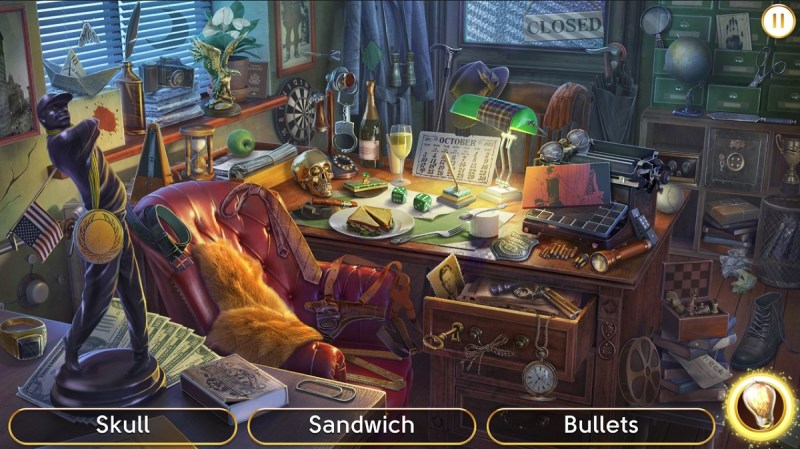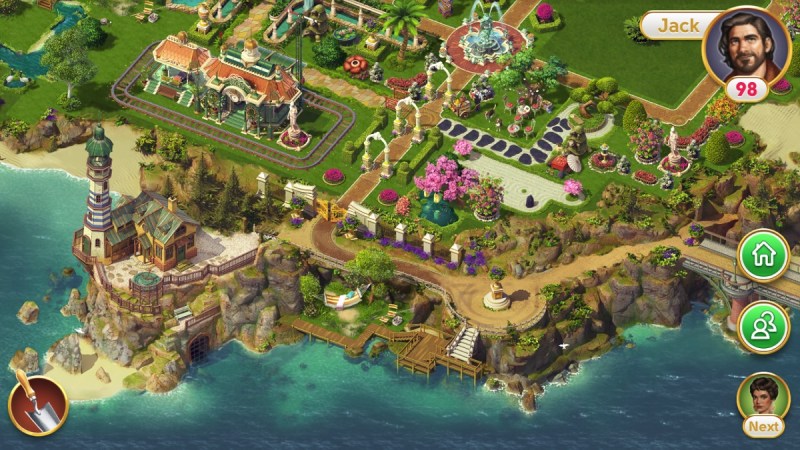Berlin’s Wooga rose to prominence in mobile games on the strength of casual games like Diamond Dash and Bubble Island. But the company had another round of layoffs in February as it decided to de-emphasize pure casual and focus on what has become its core strength: story-based casual games like June’s Journey and Pearl’s Peril.
Wooga has decided that the mobile game business is so ultra-competitive that it needs to focus on what it does best and stick to that. June’s Journey is very demanding because the company has committed to launching an update with new story and puzzle elements every week. That’s not easy to do, and so the company is giving up on its efforts in casual mobile games.
I caught up with Wooga CEO Jens Begemann at the Game Developers Conference in San Francisco last week. He thinks the trends favor companies that focus on engagement, and that’s what Wooga hopes to deliver as it doubles down on stories for its largely female audience.
Here’s an edited transcript of our interview.

Above: Jens Begemann is CEO of Berlin-based Wooga.
GamesBeat: You guys had a strategic change once more.
Jens Begemann: Right. We have now set a sharp focus. We’ve been focused on casual games already, and in the last few years we’ve discovered that what we’re best at is story-driven casual games. We’ve seen a lot of success with our last launch in October, June’s Journey, a hidden object game where characters and story play a very big role. Going forward we’ll only do story-driven casual games. They’ll use different mechanics — hidden object mechanics, puzzle mechanics — but that’s all that we will focus on, because that’s where we have a lot of expertise.
GamesBeat: A lot less of which kind of games, then? Less of the purely casual games?
Begemann: What we wouldn’t do going forward is a game that is only focused on mechanics. We wouldn’t do, for example, a puzzle game that’s only about the levels and progression from level to level. What we’ve done with our recent launches, and what we’ll continue to do, is the characters and story always play a very big role.
To me a game is story-driven if a player thinks about the world and the characters and what will happen next in the narrative even when they’re not playing the game. When they’re commuting to work, they think about who murdered June’s sister. Who will she fall in love with? Those kinds of things. The player wouldn’t just think about only the gameplay, but would be emotionally immersed in the story and the characters.
GamesBeat: Was this more just recognizing what worked and what didn’t, what’s more successful for you guys?
Begemann: Yes. In this market, the mobile games market, it’s extremely competitive. It’s about what you’re the best at. What, as a company, can you do that you’re better at than almost everyone else in the world? We had some difficult years in the past, but we’ve been profitable in the last year. We’re growing very nicely, 30 percent from the first quarter of last year to the first quarter of this year. That success has mostly been coming from games that have more depth, characters, and story. That’s what we want to focus on going forward.
GamesBeat: So the cutbacks weren’t necessarily driven out of necessity? Is that more of a strategic change?
Begemann: Yes, it’s really about strategic focus, about being very clear on what we stand for and what we’ve been doing best in the last few years. We want to do more of that. We’re aspiring to be the best in the world in this, creating games that combine gameplay and story and characters.
GamesBeat: The strategy of doing an update almost every week, did that work well?
Begemann: Yes. These games are content-driven, obviously. For June’s Journey we’re doing a new chapter every week. Every chapter contains six new locations, a new character, a lot of dialogue. We’re still doing a new chapter every week, and I think we’re one of the few that have figured out how to do that at such a high frequency with high quality.
GamesBeat: How many teams do you have going now?
Begemann: We have six live games that we’re updating. Then we have two new games that we’re working on and creating. That’s the size of the studio. Everybody is in Berlin. It’s about 200 people.
GamesBeat: Does that feel like a good size for what you need to do?
Begemann: Yes, it does. For us, it’s really about quality, and achieving that quality with what I would call a medium-sized studio. Everybody still knows each other. We can transfer knowledge from one person to another. It doesn’t feel anonymous. At the same time, we have enough people to be able to create these content-driven, story-driven games.

Above: June’s Journey is targeted at women.
GamesBeat: Is it more like longer-lasting live operations and deeper engagement in games?
Begemann: Yes, yes. This is also reflected in our organizational structure. We have one unit focused on our live games and one unit focused on our new games. When we create a new game we create it with an aspiration to have a life cycle of five to 10 years. Pearl’s Peril, our previous hidden object game, just turned five. It’s grown in revenue every year, slightly more than the previous year. I’m certain we’ll celebrate its tenth birthday five years from now.
It’s about creating games that have this long life cycle as a foundation, and then having the live games unit where we constantly update them with new content, improve them, add features, add events. It’s a trend in the whole industry. For successful games, you have to take care of them and update them. Live operations play a huge role in making them better.
GamesBeat: For developers, are they getting accustomed to this idea? It seems like the more fun thing to do is go and work on a brand new game. Working on live operations might not be as interesting. But you have the majority of your people on live operations.
Begemann: It differs. Some people really love creating something new on a blank slate. But we’ve discovered over the years that there’s a lot of satisfaction and fun in making changes and improvements and major new features for a live game. You can see the customer reaction right away. I think that’s the biggest benefit.
When you create a new game, it may take two years until you see if your creation is appreciated by the world. If it’s not, that may not be such a great feeling. Working on a live game, you can create something new, a new feature, and within weeks or a few months you can see user reaction. You can see your creation out there played by millions of people. We have discovered over the last few years that that’s something more and more game creators appreciate. More than was the case in the past. I think there’s been a change of mindset.
GamesBeat: So telling a continuous story can be as fun as making something new?
Begemann: I think so, yeah.
GamesBeat: Looking at the whole game industry, where do you think we stand now in mobile?
Begemann: In mobile we see that the market is extremely competitive. For everyone working in mobile, it’s about what you’re the best at. If you’re just one of many in a segment or a genre or a specific part of the market, you have no chance. So I see a trend toward specialization.
I also see a trend toward consolidation. It’s getting harder for smaller studios, because of user acquisition, because of cross-promotion between different games, because of the effort required to build games. And I see a trend toward deeper experiences. Our response to that is story and characters. Other games are responding to that with deeper mechanics or longer-term metagames. It’s about games that people play for five years or more, instead of downloading a new one every week.

Above: Pearl’s Peril
GamesBeat: How do you feel about iOS versus Android? Are you mainly neutral?
Begemann: Both platforms are equally important. To me it’s the choice of the player, the consumer, as far as which device to go with. We cater to both of them equally and serve both of them equally well. But it’s clearly those two.
GamesBeat: Does the fragmentation on Android cause you a lot of trouble?
Begemann: We’ve gotten used to it, over the years, dealing with quite a big variety of devices. We’re basically doing games where we optimize for a sweet spot that’s around a 5-5.5” display, but we make sure it also works on a 4” phone or a 10” tablet. Because we develop in Unity and use the Unity to WebGL export, we can also provide these games on the web. June’s Journey, you can play it on Facebook, and it’s from the same code base. Our developers ensure that from a 4” phone to a 15” laptop, you can play a game.
That’s been quite a challenge over the last few years, but now that we’ve designed games in such a way that they allow us to address a variety of devices, it’s not about fragmentation on any particular platform. It’s more about just keeping that in mind when creating new games.
GamesBeat: What do you think about what’s been done lately in game discovery and app store reorganization?
Begemann: On the Apple App Store we like the game of the day, the editorial aspect of it. When June’s Journey was the game of the day and the Apple editorial team gave it some attention, we saw that the users who installed from there were retaining very well. They had considered the game and read about it before they downloaded it. On Google we very much like the personalized experience. Google Play recommends games that are relevant to you. That’s working quite well.
Here at GDC, the Google Developer Days are ongoing, and they’ve had some announcements recently, with more coming. We like what’s coming out of there as well.

Above: June’s Journey was made by a team of 60 people.
GamesBeat: Have you seen anything you think you can make use of? What do you think of the Google Maps game API?
Begemann: We haven’t decided yet. It’s something where we’ll be brainstorming when we’re back from GDC, what features we might be using in future games. Instant Games is interesting, too, an interesting announcement.
GamesBeat: Is there anything else that the show that you’re excited to watch?
Begemann: In general I’m curious about what will happen to games on different messenger platforms, Facebook Messenger and others. What will happen to that over the next few months? That’s something I’ve been observing.
GamesBeat: What about AR? I don’t know if hidden objects and AR could work.
Begemann: We have nothing in development there. I’m observing what’s happening. It’s very interesting from a technological perspective. I think nobody yet has figured out a user experience that’s compelling in the long term. Our criteria for any game is, would you play this every day for more than a year? A game that doesn’t fulfill that, we wouldn’t do it. I see a lot of novelty and a lot of interesting technology. We haven’t yet seen anything where I’d use it every day for a year.

